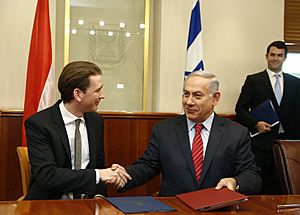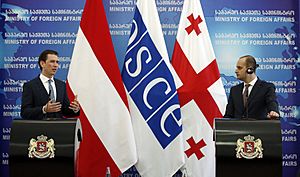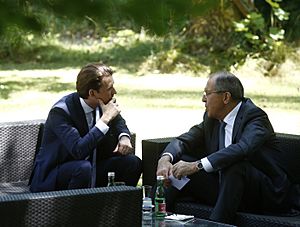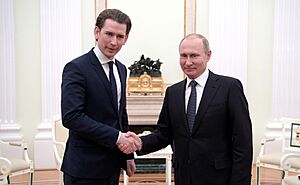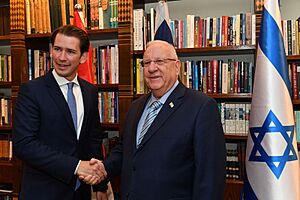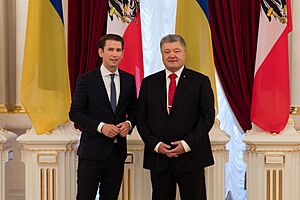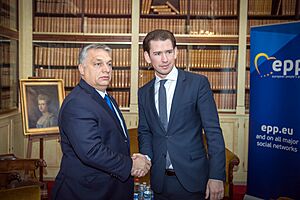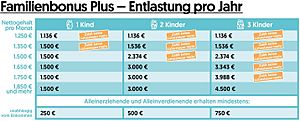Sebastian Kurz facts for kids
Quick facts for kids
Sebastian Kurz
|
|
|---|---|
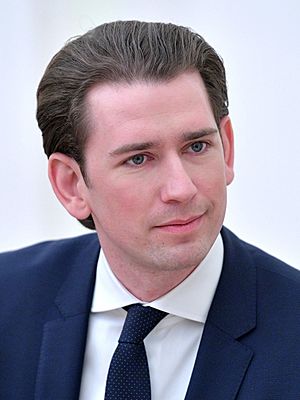
Kurz in 2018
|
|
| Chancellor of Austria | |
| In office 7 January 2020 – 11 October 2021 |
|
| President | Alexander Van der Bellen |
| Vice-Chancellor | Werner Kogler |
| Preceded by | Brigitte Bierlein |
| Succeeded by | Alexander Schallenberg |
| In office 18 December 2017 – 28 May 2019 |
|
| President | Alexander Van der Bellen |
| Vice-Chancellor | Heinz-Christian Strache Hartwig Löger |
| Preceded by | Christian Kern |
| Succeeded by | Brigitte Bierlein |
| Chairman of the People's Party | |
| In office 14 May 2017 – 3 December 2021 |
|
| Preceded by | Reinhold Mitterlehner |
| Succeeded by | Karl Nehammer |
| Minister of Foreign Affairs | |
| In office 16 December 2013 – 18 December 2017 |
|
| Chancellor | Werner Faymann Christian Kern |
| Preceded by | Michael Spindelegger |
| Succeeded by | Karin Kneissl |
| Personal details | |
| Born | 27 August 1986 Meidling, Vienna, Austria |
| Political party | Austrian People's Party (2003–present) |
| Domestic partner | Susanne Thier |
| Children | 1 |
| Parents |
|
| Residences | Meidling, Vienna |
| Education | GRG 12 Erlgasse (Matura) |
| Cabinet |
|
| Signature |  |
| Website |
|
| Military service | |
| Allegiance | |
| Branch/service | |
| Years of service | 2004–2005 |
| Unit | Maria Theresa's Barracks |
Sebastian Kurz (born 27 August 1986) is an Austrian former politician. He served twice as the Chancellor of Austria, which is like being the head of government for the country. His first time as Chancellor was from 2017 to 2019, and his second time was from 2020 to 2021.
Kurz grew up in Meidling, a district in Vienna, Austria. He started his political journey in 2003 by joining the Young People's Party (JVP). He quickly moved up in the party. In 2011, he became a state secretary, helping with the social integration of refugees. After the 2013 election, he became Austria's Foreign Minister and held this important role until December 2017.
In May 2017, Kurz became the leader of the Austrian People's Party (ÖVP). He ran for Chancellor in the 2017 election, promising to modernize Austria and deal with immigration issues. His young age and fresh ideas helped him win by a lot. He then formed his first government, working with the Freedom Party of Austria (FPÖ). During this time, he tried to keep his promises, but some people criticized his leadership style. After some political issues, including a scandal in 2019, his government ended. He and his cabinet were removed from office by a vote in Parliament.
After a new election in 2019, Kurz returned to power. This time, he formed a government with the Green Party. His second government started in January 2020. However, their plans were soon changed by the COVID-19 pandemic. His government responded with lockdowns and curfews. An investigation into his actions, along with other challenges, led Kurz to resign as Chancellor in October 2021. He remained the party leader and a member of Parliament for a short time, still influencing government decisions. Two months later, Kurz left politics completely and began working for a private investment company.
Sebastian Kurz was the youngest Chancellor in Austrian history. For about four years, he was also the youngest head of government in the world. Many people believe his youth and political approach helped bring new energy to the traditional conservative movement in Austria and Europe.
Contents
Early Life and Education
Sebastian Kurz was born on 27 August 1986 in Vienna. He is the only child of Elisabeth and Josef Kurz. His father is an engineer, and his mother is a school teacher. Kurz grew up in Meidling, Vienna, where he still lives.
He finished high school in 2004 and completed his required military service in 2005. He started studying law at the University of Vienna but later left to focus on his political career. Kurz is in a relationship with Susanne Thier, and they have a son named Konstantin.
Start in Politics
Youth Politics
Kurz joined the Young People's Party (JVP) in 2003. From 2008 to 2012, he was the chairman of the JVP in Vienna. He led the youth part of the Austrian People's Party (ÖVP) election campaign in 2010. In 2009, he was elected chairman of the Austrian JVP with almost all votes. He was re-elected in 2014.
From 2010 to 2011, he was a member of the Vienna State and Municipality Diet, focusing on fair pensions. In June 2011, he became the state secretary for integration in the Interior Ministry. After the 2013 election, he briefly served as a member of Parliament. In December 2013, Kurz became the country's youngest Foreign Minister at age 27.
State Secretary for Integration
As state secretary for integration, Kurz believed that good relationships between the government and religious groups were important for social integration. He suggested new policies, like a second required preschool year for students who needed to improve their language skills.
In 2011, the Foreign Ministry, the Austrian Integration Fund, and the Education Ministry started a project called Zusammen:Österreich (Together:Austria). This project aimed to help immigrants learn about Austrian culture and traditions. It also taught Western ideas like religious freedom and democracy.
Foreign Minister Role
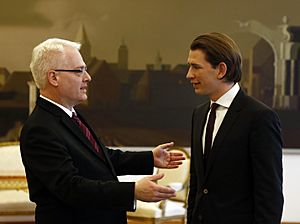
After the 2013 election, Kurz became the head of the Foreign Ministry. In March 2014, the Foreign Ministry also became responsible for integration issues. Kurz made improving Austria's relationship with the Western Balkans a top goal. He also felt it was important to have a strong relationship with Israel and the Jewish community.
In February 2014, he visited Belgrade and confirmed Austria's support for Serbia joining the European Union (EU).
In November 2014, Kurz launched a campaign called "#stolzdrauf" (proud of it) to encourage patriotism on social media. Many famous people and organizations supported this campaign.
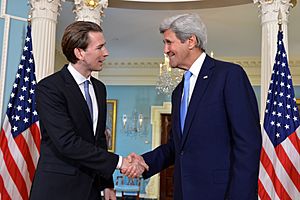
In February 2015, Parliament passed a change to the Islam law. This change stopped foreign funding for Islamic religious groups. It also gave Muslims the right to religious support in the military, prisons, hospitals, and nursing homes.
In June 2015, Kurz suggested changing child benefits for foreign EU citizens who work in Austria but whose children live in their home country. He wanted the benefits to match the cost of living in their home country.
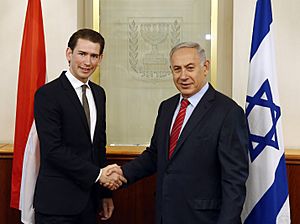
In January 2016, Kurz said that "ugly pictures" of border security were unavoidable. This comment caused some debate.
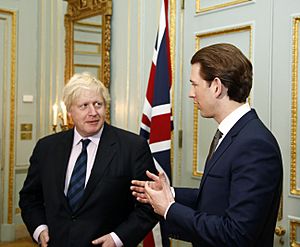
In July 2016, Parliament passed a law that helps people get their foreign qualifications recognized in Austria.
As Foreign Minister, Kurz visited Belarus and Moscow in May 2015. He met with Russian Foreign Minister Sergei Lavrov. He stated that Russia's actions in Crimea were against international law. He also said that peace could only be achieved "with and not against Russia."
In May 2016, Kurz visited Israel and met with Prime Minister Benjamin Netanyahu. They signed agreements on travel and education.
In March 2017, Kurz said that rescue operations in the Mediterranean Sea were leading to more refugees dying. He suggested that rescued refugees should be taken to camps outside Europe.
In March 2017, the government approved the Integration Act. This law introduced German language classes and mandatory "language and value" courses for refugees. It also banned the distribution of the Quran by Salafists in public areas and banned full face veils in public spaces.
In January 2017, Kurz became the chairman of the Organization for Security and Co-operation in Europe (OSCE) for a year.
On 18 December 2017, Kurz left his role as Foreign Minister to become Chancellor.
Leading the ÖVP Party
In May 2017, the previous leader of the ÖVP, Reinhold Mitterlehner, resigned. Kurz was then chosen as the new chairman on 14 May. He asked for more power to choose the party's candidates for elections, and the party agreed to most of his requests.
On 1 July 2017, Kurz was officially elected chairman of the ÖVP by a large majority of votes.
2017 Election Campaign
In the 2017 election, the ÖVP ran under the name "Sebastian Kurz list – the new People's Party." Kurz promised tax cuts and changes to social services. He also aimed to improve education, research, and the environment.
He presented a plan for "Order and Security," stating that people arriving illegally should be returned to their home countries. He also called for better rules for legal immigration and stronger punishments for violence against women.
Time as Chancellor
First Term (2017–2019)
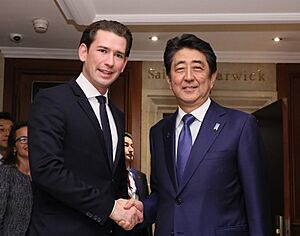
In the 2017 election, Kurz's party won the most votes. As the leader of the winning party, President Alexander Van der Bellen asked Kurz to form a new government. Since his party didn't have a majority, Kurz decided to form a coalition with the FPÖ. This new government, known as the Kurz cabinet, was sworn in on 18 December 2017.
Under this government, Kurz was Chancellor, and his party held five ministries. The FPÖ held the Vice-Chancellorship and six ministries.
End of First Term
On 17 May 2019, a scandal involving the Vice Chancellor and FPÖ chairman, Heinz-Christian Strache, became public. This event, known as the Ibiza affair, involved discussions about political favors. Both Strache and another FPÖ official resigned the next day. Kurz wanted to continue the government but asked for the Interior Minister, Herbert Kickl, to be replaced. The FPÖ refused.
As a result, Kurz ended the coalition agreement and asked the President to remove Kickl from office, which the President did. After Kickl's removal, the other FPÖ ministers also resigned, ending the coalition. Kurz then appointed temporary experts to fill the empty ministry roles.
Because Kurz no longer had a majority in Parliament, a "motion of no confidence" was proposed against his government. This motion passed on 27 May, meaning Parliament no longer supported him. The next day, the President officially removed all cabinet members. This was the first time in Austrian history that a Chancellor and the entire cabinet were removed by a vote of no confidence.
Second Term (2020–2021)
Forming a New Government
In September 2019, the ÖVP won the 2019 election by a large margin. Once again, President Alexander Van der Bellen asked Kurz to form a new government. After discussions with several parties, Kurz announced on 11 November that the ÖVP would negotiate a coalition with the Green Party.
By the end of December, the negotiations were successful. The new government's plan was presented on 2 January 2020. Kurz was sworn in as Chancellor for his second term on 7 January 2020.
In this second government, Kurz was Chancellor, and his party held eight ministries. The Green Party held the Vice-Chancellorship and four ministries. This was the first time the Green Party was part of an Austrian government.
End of Second Term
On 6 October 2021, an investigation began into Kurz and his close associates. Prosecutors looked into claims that Kurz had influenced news outlets in 2016 to spread negative information about a political rival. They also looked into claims of misusing government funds.
After this investigation became public, opposition parties asked Kurz to resign. The Green Party also considered supporting a vote to remove him if he didn't step down. On 9 October 2021, Kurz resigned as Chancellor. However, he announced he would remain the party chairman and lead the party in Parliament. Opposition parties criticized this, saying he would still control things from behind the scenes.
On 11 October 2021, President Alexander Van der Bellen officially removed Kurz from office and appointed Alexander Schallenberg, who was then the Foreign Minister, as the new Chancellor.
After the Chancellorship (2021)
After resigning as Chancellor, some people called Kurz the "shadow chancellor" because he still had a lot of influence as the leader of the main party in the government. He was elected as the parliamentary leader of the ÖVP on 11 October 2021.
On 16 November 2021, a parliamentary committee voted to remove his legal immunity, allowing the investigation into his actions to continue.
On 3 December 2021, Kurz resigned from all his remaining political positions and left politics completely. He said his newborn son was the main reason for his decision.
In February 2024, Kurz received an eight-month suspended sentence after being found guilty of making false statements in court during a parliamentary inquiry. In May 2025, a higher court overturned this conviction.
Key Political Actions
Social Policies
Family Bonus Plus Act
In June 2018, Kurz introduced the Family Bonus Plus Act. This law, which started in January 2019, offers tax deductions for parents. They can deduct up to €1,500 per year for each child under 18 and €500 for older children. This helps parents who already receive child benefits from the government.
Social Security Act
In November 2018, the government created the Social Security Act, which became law in March 2019. This law set national rules for basic income and unemployment benefits. It set a maximum basic income of €863.04 per month for single people. Immigrants with limited German language skills receive a reduced basic income, with the difference meant to cover German language classes.
Social Insurance Reform Act
In December 2018, Parliament passed the Social Insurance Reform Act. This law aimed to modernize Austria's public administration by combining social insurance companies. Kurz said this would help insured people.
The law merged several health insurance providers into a single federal system (ÖGK). It also combined social insurance for commerce and agriculture into one for self-employed people (SVS).
Immigration Policies
Compulsory German Language Classes
On 16 May 2018, the Kurz government made German language classes mandatory for children who don't speak German well. These special classes are held in schools with at least eight such students. Students are tested when they enroll and must attend these classes for a certain number of hours per week until their German improves.
Child Benefits for Foreigners Reform Act
In October 2018, the Kurz government passed a law that changed child benefits for foreign EU citizens. If these workers are employed in Austria but their children live in their home country, their child benefits are adjusted to match the cost of living in their home country.
Global Compact for Migration
On 31 October 2018, Kurz announced that Austria would not join the Global Compact for Migration. He stated that he believed it would affect Austria's independence and not clearly separate illegal from legal immigration.
Other Actions
Working Hours Reform Act
In July 2018, the Kurz government passed a change to the working time law, often called the "12-hour workday." This law extended the maximum workday from ten to twelve hours and the maximum work week from fifty to sixty hours. The government said this allowed employees to work more voluntarily.
Monitoring Compact
In April 2018, the government passed the monitoring compact, also called the security compact. This law allows authorities to monitor messaging services like WhatsApp and Skype for people suspected of serious crimes or terrorism. It also allows authorities to access video and audio surveillance from public transportation and airports.
Digital Office
On 19 March 2019, the Kurz government launched the Digital Office mobile app and the website oesterreich.gv.at. These platforms combine government online services, allowing citizens to interact with authorities through the internet. Users can register their homes, request birth certificates, and store passport pictures.
Council of the European Union Presidency
During Austria's time as president of the Council of the European Union from July to December 2018, Kurz supported stronger protection of the Schengen Area. He suggested that border guards should stop migrant boats from entering Europe.
The Smoking Ban
In March 2018, the Kurz government reversed a general smoking ban that was supposed to start in May 2018. This reversal was a promise made by the FPÖ party. Even though the ÖVP had supported the ban before, they voted to repeal it as part of their agreement with the FPÖ.
This decision was very controversial, as many people, including health experts and most Austrians, were against it. The ban would have completely stopped smoking in all coffee shops and restaurants. However, the new law also made it illegal to sell tobacco to minors and banned smoking in cars when children are present.
After the first Kurz government ended, Parliament reinstated the smoking ban in July 2019.
Political Views
Islam Policy
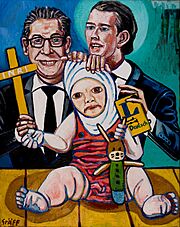
As Foreign Minister, Kurz asked an expert to study Islamic kindergartens. The study found that some extreme views were increasing. As a result, the government of Vienna and the Foreign Ministry started to look more closely at Islamic kindergartens. In June 2017, Kurz suggested that all Islamic kindergartens should be closed if they were isolating children from society.
After a ban on full face veils was passed by a previous government, Kurz's government also passed a headscarf ban in kindergartens. They planned to extend this ban to elementary schools.
In March 2019, the government announced plans to create a new agency to monitor Islamic political activities in Austria. Kurz said this was needed to protect Austria's democratic system.
Same-Sex Marriage
In December 2017, a court ruling led to the legalization of same-sex marriage in Austria. Before this, both the ÖVP and FPÖ had opposed same-sex marriage. Kurz himself opposed same-sex marriage, stating that legal discrimination had already been removed with the introduction of registered partnerships.
Economic Policy
In his 2017 election campaign, Kurz spoke against increasing national debt and for reducing government spending and budget deficits. He wanted to achieve this by cutting payroll and income taxes. Kurz also opposed any taxes on inheritance, property, and wealth. He wanted to keep cash as a common payment method.
In December 2018, Kurz announced a nationwide digital tax to help fund a major tax reform.
Message Control
As Chancellor, Kurz put in place strict rules for how the government and ministries communicated. The goal was to make sure the government presented a unified message. Journalists accused Kurz's government of trying to control media coverage by avoiding questions and using other methods.
Public Image
Many people described Kurz as "eloquent" and "succinct." In 2014, a German news agency called him one of "the seven winners on the political world stage."
Time magazine listed Kurz as one of ten "Next Generation Leaders" in 2017, calling him a "statesman of a new kind" who found a way to deal with the European refugee crisis. Some compared his rise to power to that of French president Emmanuel Macron.
In 2018, the term "silent chancellor" became Austria's Word of the Year for the second time. The jury chose this because Kurz often avoided commenting on issues he didn't like or controversial statements made by his coalition partner.
In 2019, Spiegel Online listed Kurz as an important international figure, noting his young age and his government with right-wing populists. They observed that he often remained silent on controversial issues while his approval ratings stayed high.
Kurz's response to the COVID-19 pandemic was not very popular, and his approval ratings dropped. This, along with the investigation into his actions, caused his political career to end. At the end of 2021, a media group named Kurz a "Corrupt Person of the Year Finalist."
After Politics
Since 2022, Kurz has been working as a global strategist for Thiel Capital, a private investment company. In January 2022, he was also appointed co-chairman of the European Council on Tolerance and Reconciliation. He also started his own investment management and consultancy firm, SK Management. Later that year, he co-founded a cybersecurity company based in Israel.
Honours
| Award or decoration | Conferred by | Date |
|---|---|---|
| Honorary Citizen | 10 January 2018 | |
| Jerusalem Navigator | European Jewish Congress | 20 November 2018 |
| Ludwig Erhard Token of Commemoration | Economic Council Germany | 31 August 2021 |
| Order of the Republic of Serbia | Serbia | 4 September 2021 |
Images for kids
See also
 In Spanish: Sebastian Kurz para niños
In Spanish: Sebastian Kurz para niños
 | Lonnie Johnson |
 | Granville Woods |
 | Lewis Howard Latimer |
 | James West |


